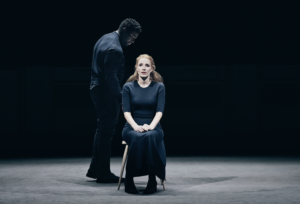House Broken
Even a marquee name can’t save this revival of A Doll’s House.
BY CHRISTOPHER BYRNE

When it works, the current trend of stripping down classics to reveal greater truths can be a powerful and effective theatrical device. Both David Cromer’s magnificent staging of Our Town (2009) and Daniel Fish’s Oklahoma (2018) dispensed with the gauzy nostalgia that usually surrounds these iconic works and revealed harsher, darker realities of American life. In both cases, the resulting productions were closer to the original authors’ intentions, and their pieces had been hijacked over decades by a jingoistic and overly romanticized look at America at the dawn of the 20th century. Neither Thornton Wilder nor Rodgers and Hammerstein could, on close examination, be called Pollyanna’s about life in our country.
When the device doesn’t work—as with the new production of A Doll’s House at the Hudson Theatre—the result is disastrous, and in this case the result is nearly two hours of pretension and tedium. Moreover, Amy Herzog’s psychobabble-drenched revision of the classic Ibsen work insults the intelligence of the audience. Does she really think that an audience—for Ibsen no less—is so in need of being led by the nose that they can’t see the modern resonance of Ibsen’s 1879 play about a wife finding her own agency and power in the original text? Does the play have to be chopped down to fit into a palatable length for a contemporary audience? (The original usually plays in about three hours.) Is it mainly a vehicle to gawk at a movie star? Apparently so on all counts, and it’s too bad, particularly since the Tony-winning production starring Janet McTeer (1997) is still surprisingly fresh in memory, though it’s nearly a quarter of a century old. (That, in fact, is the power of theater. Spectacular performances last a lifetime in the memories of those who saw them.) What will linger from Jamie Llloyd’s bland and uninspired production is the image of movie star Jessica Chastain spinning on a turntable for a full fifteen minutes before the play begins, giving the audience plenty of opportunity to snap pics on their phones. (The star-gawking part of the proceedings.)

Although the date 1879 is projected on the bare back wall of the theater (on Soutra Gilmour’s “set,” a dismal, gray void with turntables that would be better suited to Genet’s No Exit), Lloyd and Herzog are apparently determined to set the play in the present. It’s not just the language but the dreary, black and gray costumes, somewhere between business casual and athleisure, give us none of the sense of a striving middle class in Norway at the end of the 19th century. That lack undermines and demeans the plot and the cultural significance of the piece. The options available to Nora Helmer as woman in the original period were limited. She had no rights to her children. She could have no independent finances; she was constricted in so many ways as a person that her decision to leave nominal comfort for the unknown has much higher stakes. Thus, this Nora comes across as selfish, mean-spirited, and immature. She is not straining against a culture that is inherently anti-woman; she just wants what she wants. Indeed, the central conflict of the play—that Nora has taken an illegal loan from a loan shark to support her husband and is about to be exposed—has no teeth. And how did she get in this pickle? In this telling, she’s a minor shopaholic who has over-spent, but if her husband gets a promised promotion at the bank where he works, all will be repaid, and neither Nora nor her husband Torvald will be exposed.
Lloyd’s staging does nothing to show the world closing in on Nora, the pressure cooker she lives in, despite nominal comfort and a loving family. It is impossible to empathize with this Nora, and thus the dramatic impact of the play collapses on itself. Even Nora’s final speech about how she has to find herself is confusing, so riddled with contemporary cliché’s that it has no real meaning—and certainly no emotional depth. Her final exit—the famous door slamming when Nora finally leaves her home, fully accepting the consequences of her actions—in this production is a slick gimmick that one supposes (if one tries very hard) is a meta commentary on the theater, but at the performance I saw it got laughs and applause. Not what Ibsen intended.

Lloyd’s staging does the actors no favors either. The turntables do most of the movement, and the actors mostly sit in chairs, hampering any physicality. (Well, except for an absurd and laughable “dance” Nora does. It’s cringe-inducing to watch.) The actors are all heavily miced and the amplification and processed sound removes the performances even further from the audience, dehumanizing them even more than the largely affectless staging. When there is emotion, the performances swing between understated and scenery chewing, particularly from Arian Moayed as Torvald. Perhaps because the play has been so cut and since we only see him standing or sitting with virtually no movement, Torvald makes little sense; we don’t see the pressure this society puts on him as well as Nora. That’s a miss. Moayed’s performance, though, is misdirected; he is an extraordinary actor who’s impressed me in many other roles and has been cooly amoral in the hit HBO series Succession. Similarly Jessica Chastain is a wonderful movie actress, but here she’s been so constrained as to convey only a fraction of Nora’s range. In fact, the only actor who seems to thrive in this bleak concept is Michael Patrick Thornton as Dr. Rank, a family friend who is in love with Nora. He finds some compelling complexity in the character that provides some real human moments.
Ultimately, the whose affair seems like an undergraduate acting exercise where self-reverential “artistic vision” is imposed on a piece, but that concept is too abstract to be reflected in performance.
I could never get into this Doll’s House; it left me cold, frustrated, and unmoved. As my companion for the evening said, “For $200 a ticket, most people want to see a set.” That would not merely have provided a relatable context for the world of the play, it would have given what Dickens called “a practicable door” to hit this ill-conceived production on its way out.
A Doll’s House
Hudson Theatre
141 West 44th Street
Tues-Thurs 7 p.m.; Fri, Sat 8 p.m.; Weds, Sat 2 p.m.; Sun 3 p.m.
Tickets from $70 here.
1 hour 45 mins, no intermission
Photo Credit: Emilio Madrid
Published March 26, 2023







More Stories
Off-Broadway Review: Trophy Boys
Broadway Preview: Lewis Flinn’s Cabaret
Off-Broadway Revew: The Imaginary Invalid